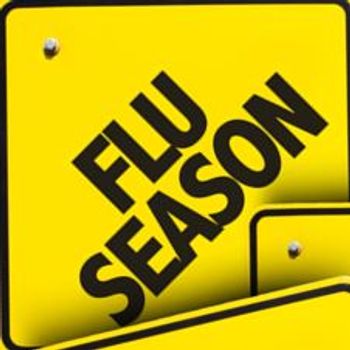
Case 1: 30-Year-Old Pregnant Female In The 2nd Trimester
John Russell, MD, FAAFP, presents the case of a 30-year-old pregnant woman in her 2nd trimester and reviews the appropriate vaccination strategies for this patient.
Episodes in this series

John Russell, MD, FAAFP: My first patient I'd like to discuss with you all [and] get your collective wisdom is a 30-year-old pregnant female. She's in her second trimester. She comes to see her source of primary care and says she's concerned about contracting the flu with the impending flu season. She wants to discuss her vaccination options. She's not sure she's eligible for vaccine because she's pregnant and she's not completely sure if it's safe to get the vaccine when she's pregnant. So, Neil, why don’t you kick it off for us about flu vaccine in a pregnant population?
Neil Skolnik, MD: It's so important, John. And I'll tell you, I'm glad you raised the question about safety, because that's what I hear more often than concern about getting the flu. The reality is young people and pregnant people are included in that group of young people. Young people are usually not that afraid of the flu, and so this is more often me proactively recommending a vaccine because pregnancy is a time when your immune system is actually lower and your respiratory system is somewhat compromised, particularly in the second and third trimester of pregnancy, such that, there's very good evidence that women who are pregnant have worse outcomes when getting the flu. Many of our patients don't recognize that. It's important to let them know that. Then the question of safety comes up and there it is, very straightforward, and this has been looked at very carefully because it's obviously a very important area. Flu vaccine is very safe in pregnancy, and it's been shown to reduce the risk of flu-associated infection and severe infection as well as, and this is important to mothers to be, as well as severe infection in their infant in the first few months of life before that infant is able to get vaccinated.
John Russell, MD, FAAFP: So, JAM, as a pharmacist, if you were weighing out with a patient in front of you [who is] pregnant. Is there a best trimester to be vaccinated?
Jacinda Abdul-Mutakabbir, PharmD, MPH, AAHIVP: So, when I, of course, talk with my pregnant patients, I to talk to them from a place of understanding because I have not been pregnant. So, I understand the fear that comes with being pregnant and vaccinating. I also, of course, explained to them that an inactivated vaccine would be what they would be receiving so they wouldn't have to worry about it crossing the placenta. So, when we get to the matter of trimesters’ I always tell them, you know, if you get it in the second or third trimester and data supports this, that women are more likely to not only be protected throughout the flu season and during the time that they're pregnant, but to also provide antibodies for that protection to their kids for maybe not, you know, a long duration, but at least for however long that flu season would be. So, oftentimes when I do tell that to moms, and especially our newer moms, they're very excited about not only being able to protect themselves, especially from the complications that I think were so eloquently described that just decrease the immune function and increase ability and capability for just the really bad complications that they can have while being pregnant, but also their aid. When you tell them you can protect your child for X amount of time, they are so enthusiastic to be able to do that. So, I think that's also very important.
John Russell, MD, FAAFP: So, Chuck, a couple of times you've talked about, you know, the best vaccine is when it can get in the patient's arm, but I guess during most of the flu season, if you opened the fridge in your office, you probably have 5 different flu vaccines. So, you've got a pregnant patient in front of you and you've got 5 different things to recommend, how are you teasing out that recommendation? And is one more of a recommendation than another one?
Charles Vega, MD, FAAFP: Right, that's a really good point. I think, from a safety and tolerability standpoint, there's really not a lot that stands out between vaccines, particularly when applied to a pregnant woman, particularly if she doesn't have any significant comorbidities, but we are talking only about inactivated vaccines here. So, you have a wide array of choices, as you mentioned, and I think that you could look to our recombinant vaccines here that they may have some advantage with regards to having a better efficacy against currently circulating influenza viruses. There is literature to support this over the past several years. Pregnancy is a critical, high-risk time, so that could be a consideration, but I don't have 5 vaccines, I might have 2, and so therefore I'm going to go with what I have. I'm going to also be very cognizant of what the patient's third-party payer will allow, because we do not want to say, “there's no prior authorization here.” We need to get the vaccine on board now while you're here and we know it's going to be effective.
John Russell, MD, FAAFP: Wendy, I would imagine in your practice, you individualize care to all your patients, right? And I would imagine, you know, a pregnant mom talking about flu vaccine isn't a trivial little data point, P-value. How do you kind of individualize those patient preferences as you're having this discussion?
Wendy Wright, DNP, ANP-BC, FNP-BC, FAANP, FAAN, FNAP: Well, first of all, you're absolutely right, we do personalize care. Number 1, as a short, concise, but strong recommendation, my recommendation to them is you are able to get the flu shot at any point in pregnancy. I remember back in when H1N1 hit and how H1N1 so adversely affected the pregnant woman and how we really, now for the last, what, 12 years have been able to study the efficacy of these vaccines in pregnancy and more importantly, the safety. So, I make a strong, concise recommendation. It is recommended in pregnancy, and I do recommend it for you. Any point in pregnancy is fine. While I've got you here, let's get it on board. What I want to do is to not only protect you, but I want to protect your baby and give your baby passive immunity that they will have on board for up to 6 months because we can't immunize your child until 6 months of life. So, I try to make that type of recommendation, and I am not afraid to use the mom card and say, “you know what, I've been where you are. I've had to make these decisions. And I know it's scary, but here's what I've seen. Here's what I've read. And this is my recommendation to you.” Short, sweet to the point, but a strong recommendation goes a long way. And one last thing, if we look at what the Tdap [tetanus, diphtheria, and pertussis] [vaccine] has done in the last decade, giving it to pregnant women in the second and third trimester, 70% decline in infant pertussis, that is just amazing in 10 years of that recommendation. The flu [vaccine] does the same.
Charles Vega, MD, FAAFP: I would just add that influenza during pregnancy higher risk of pneumonia for the mother, higher risk of preterm delivery, as well. So, there are risks for both mother and baby, you know, just including the pregnancy and peripartum period, so that's something I find useful in counseling patients. But that concept of the passive immunity is really important to cover, too.
Transcript is AI-generated and edited for clarity and readability.
Newsletter
Enhance your clinical practice with the Patient Care newsletter, offering the latest evidence-based guidelines, diagnostic insights, and treatment strategies for primary care physicians.

































































































































